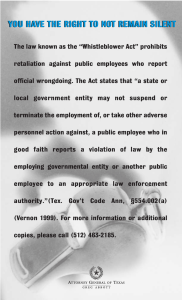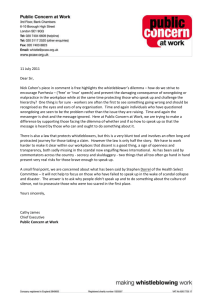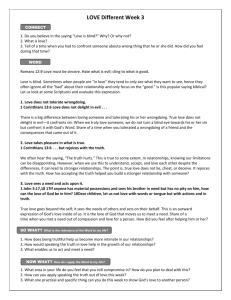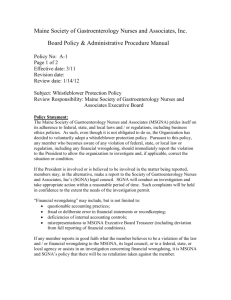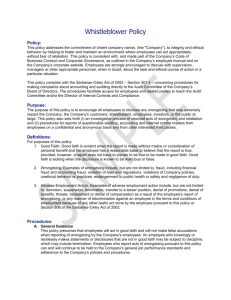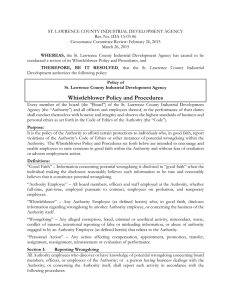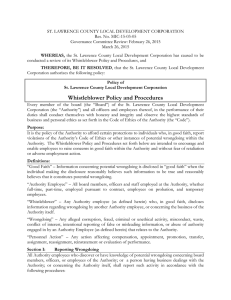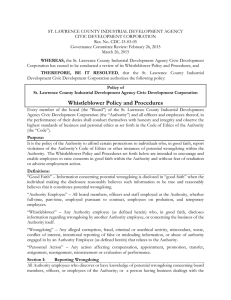NUMBER: BTRU 1.22 SECTION:
advertisement
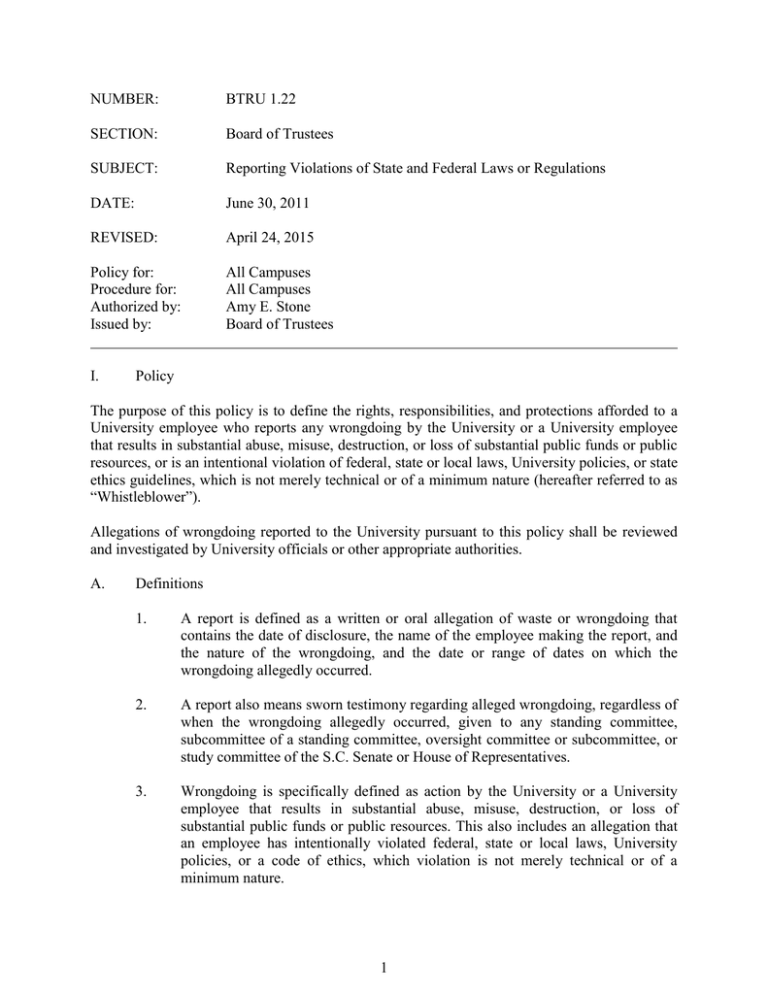
NUMBER: BTRU 1.22 SECTION: Board of Trustees SUBJECT: Reporting Violations of State and Federal Laws or Regulations DATE: June 30, 2011 REVISED: April 24, 2015 Policy for: Procedure for: Authorized by: Issued by: All Campuses All Campuses Amy E. Stone Board of Trustees I. Policy The purpose of this policy is to define the rights, responsibilities, and protections afforded to a University employee who reports any wrongdoing by the University or a University employee that results in substantial abuse, misuse, destruction, or loss of substantial public funds or public resources, or is an intentional violation of federal, state or local laws, University policies, or state ethics guidelines, which is not merely technical or of a minimum nature (hereafter referred to as “Whistleblower”). Allegations of wrongdoing reported to the University pursuant to this policy shall be reviewed and investigated by University officials or other appropriate authorities. A. Definitions 1. A report is defined as a written or oral allegation of waste or wrongdoing that contains the date of disclosure, the name of the employee making the report, and the nature of the wrongdoing, and the date or range of dates on which the wrongdoing allegedly occurred. 2. A report also means sworn testimony regarding alleged wrongdoing, regardless of when the wrongdoing allegedly occurred, given to any standing committee, subcommittee of a standing committee, oversight committee or subcommittee, or study committee of the S.C. Senate or House of Representatives. 3. Wrongdoing is specifically defined as action by the University or a University employee that results in substantial abuse, misuse, destruction, or loss of substantial public funds or public resources. This also includes an allegation that an employee has intentionally violated federal, state or local laws, University policies, or a code of ethics, which violation is not merely technical or of a minimum nature. 1 II. Procedure The University of South Carolina intends to create and maintain an environment that protects the health and safety of students, employees, and the general public, and that preserves and protects public funds and public resources from dishonesty, misuse or loss. In addition, the University intends to comply with all federal, state, and local laws and all internal policies and regulations. As such, violations of federal, state or local laws, and violations of University policies that involve dishonest or fraudulent conduct or that pose a substantial threat to the health and safety of students, employees or the general public should be reported. If an employee has knowledge of, or a concern about, such an activity, the individual should submit a report to the University using the USC Integrity Line on the Audit & Advisory Services’ website that describes the nature of the wrongdoing and the date or dates on which the alleged wrongdoing occurred. To be afforded the protections set forth in this policy, the employee submitting the report must identify himself or herself by name. The report must be submitted to the University within 180 days of the date the reporting employee first learns of the alleged wrongdoing. All reports of wrongdoing will be referred to an ad hoc resolution committee consisting of the Chief Operating Officer, the University General Counsel, the Vice President for Human Resources, and the Executive Director of Audit & Advisory Services. The committee will review and investigate, or refer to the appropriate authority for investigation, as appropriate, all reports of wrongdoing. Upon a finding of wrongdoing, the committee will notify appropriate University officials so that corrective actions can be implemented. The resolution committee will notify the Audit and Compliance Committee of the Board of Trustees immediately upon receipt of a report or determination of wrongdoing as appropriate, and will provide the Audit and Compliance Committee with quarterly reports on the status or results of investigations and the corrective actions taken to address any findings of wrongdoing. The resolution committee will reconcile its report to the report of the USC Integrity Line to ensure completeness of the reporting process. Insofar as possible, the anonymity of the Whistleblower will be maintained. However, a Whistleblower’s identity may have to be disclosed, at the discretion of the University, to comply with the law, to conduct a thorough investigation, or to provide fair procedural review for accused individuals. A. Whistleblower Responsibilities The Whistleblower must exercise sound judgment to avoid making baseless allegations. An employee, who knowingly files a report of wrongdoing that is false, unfounded, amounts to a mere technical violation, or is not made in good faith, is subject to disciplinary action, up to and including termination of employment. 2 B. Protection from Retaliation The University will not retaliate against a Whistleblower acting in good faith. This includes, but is not limited to, protection from retaliation in the form of an adverse employment action such as termination, suspension, demotion, compensation decreases, punitive work assignments, or threats of physical harm. In addition, the employment of a University employee may not be adversely affected as a result of his or her refusal to carry out a directive that constitutes fraud or is in violation of federal, state, or local law or University policy. The right of a Whistleblower to be protected from retaliation does not include immunity from disciplinary action if the Whistleblower knowingly files a report of wrongdoing that is false, unfounded, amounts to a mere technical violation, is not made in good faith, or the individual otherwise engages in any personal wrongdoing. Any Whistleblower who believes he or she has been subject to retaliation as a result of filing a report of wrongdoing should contact the Vice President for Human Resources. Any supervisor or manager who retaliates against a University employee who, in good faith, reported wrongdoing in accordance with this policy is subject to discipline, up to and including termination. III. Reason for Revision Policy organization, content, and accuracy reviewed and updated along with scrivener corrections and outdated content deleted. Policy definitions and the timeframe by which a Whistleblower must file a report of wrongdoing to be afforded Whistleblower protections were amended to comply with amendments to S.C. Code §8-27-60 resulting from the South Carolina Restructuring Act of 2014. 3
